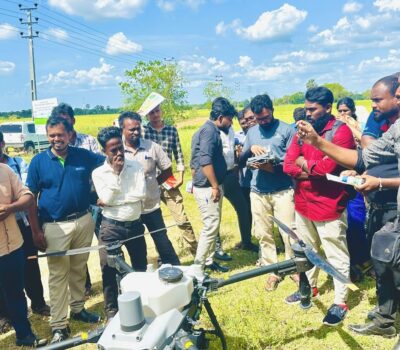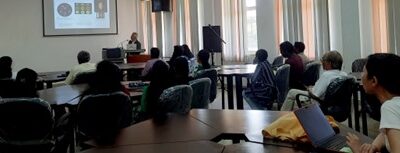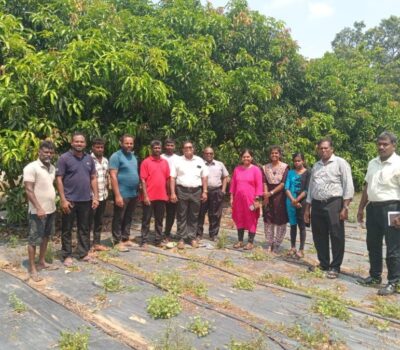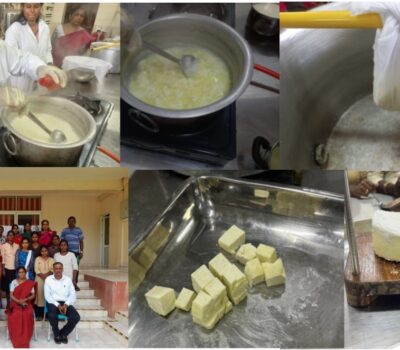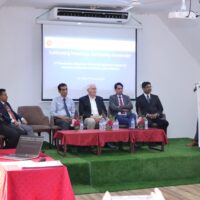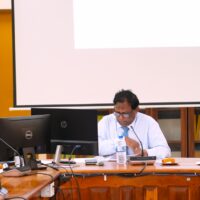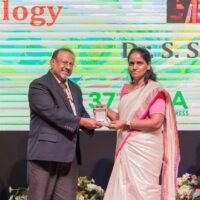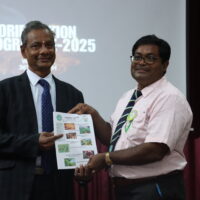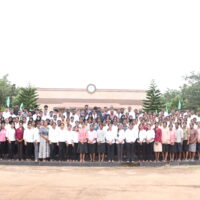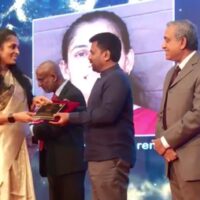Under the AHEAD programme (AHEAD/RA2/ELTAELSE/JFN/FAG/OVAA 07/WS2) the Faculty of Agriculture organized a workshop on ” Mushroom production ” on 15th of February 2022 at the Main auditorium of the Faculty of Agriculture, Ariviyal Nagar, Kilinochchi from 8.00 am-16.15 pm. The Professor Gunasingham Mikunthan, senior professor in Agricultural Biology at the Faculty of Agriculture, University of Jaffna and the Dr. K. Pakeetathan senior Lecturer in Agricultural Biology at the Faculty of Agriculture, University of Jaffna served as the resource persons. Around 62 participants (Farmers from all five district of the Northern Province, Eastern province) attended the workshop.
Mushroom is much famous among farmers because for low-cost cultivation and easy maintenance. Mushroom prefers to grow in environment which has high relative humidity, low light, rich carbon and nitrogen source and ambient temperature. Oyster mushroom on paddy straw and wheat basal substrate show faster mycelial growth rate than other substrates. As these materials are easily available in the farms and surroundings, farmers can easily access it at low cost and can begin mushroom farming in cottage or commercial level with low investment and earn more profit. Due to COVID-19, many countries have closed their border and economies are down. Therefore, the developing countries are facing severe food shortage. To overcome this problem in our country, we have to produce safe food for our people ourselves. Mushroom production is one of the low investments drawing agro-based industry. Many poor farmers and women headed families started mushroom farming in cottage level, but have give-up completely due to the poor knowledge, skills and knowledge on mushroom production, processing and marketing. Therefore, this workshop aimed to impart the technical knowledge and aspects of mushroom production.
The workshop started with the opening remarks delivered by the AHEAD Activity coordinator (Activity 5) Dr. K. Pakeerathan. Then the Dr.S.Vasantharuba, Dean, Faculty of Agriculture briefed the activities of the Faculty of Agriculture under taking to uplift the society through community engagement programme. Thereafter, sessions of the workshop started with series of lectures and field demonstrations about mushroom technology.
The resource persons focused on importance of the mushroom farming, available edible mushroom, how to differentiate edible mushroom from poisonous mushroom, applicable techniques and technologies in spawn production, and mushroom production, methods to develop commercial scale mushroom production unit, marketing strategies and problems while running mushroom unit. Farmers were actively participated in sum-up discussion after completion of every session. The seminar was end with the awarding certificates to participants and resource persons and concluding remarks.
At the end of the workshop participants gave the feed-back as summary. Key points of the feed backs are
- They are confident enough to startup a new mushroom unit
- The gained the knowledge on design and construction of mushroom cultivation unit
- They are very clear on prevention of contaminations while mushroom production
- They will apply new skills learned to sort out the currently facing technical problems.





